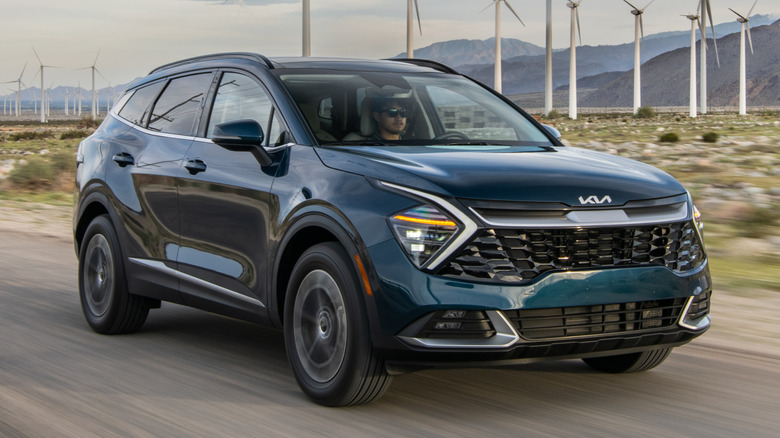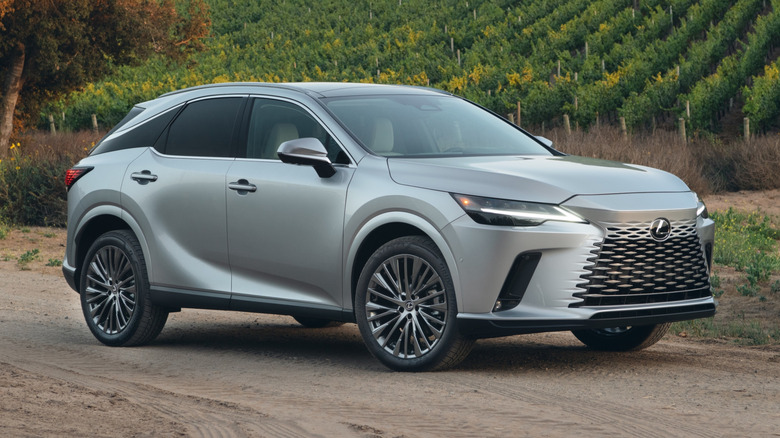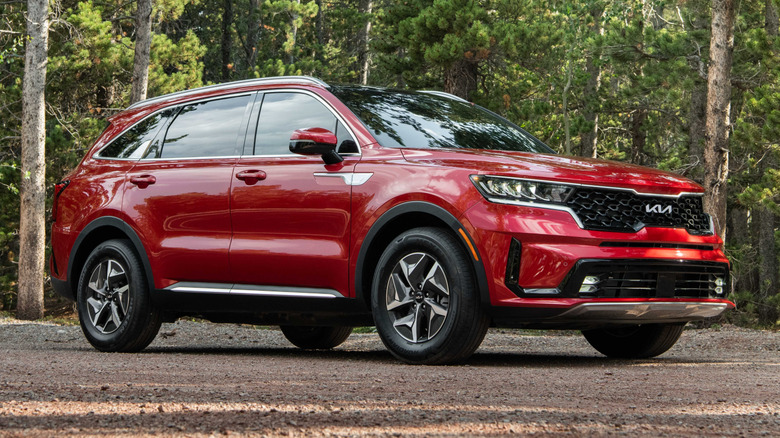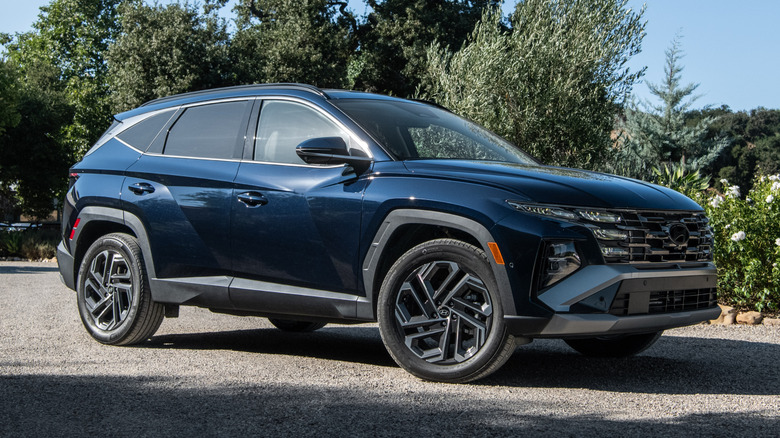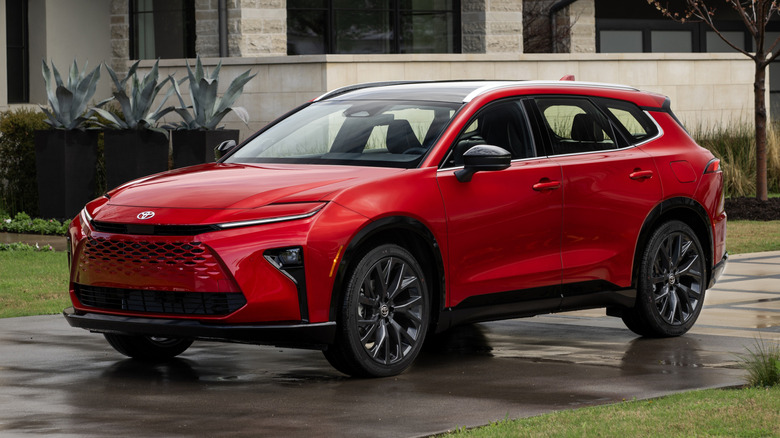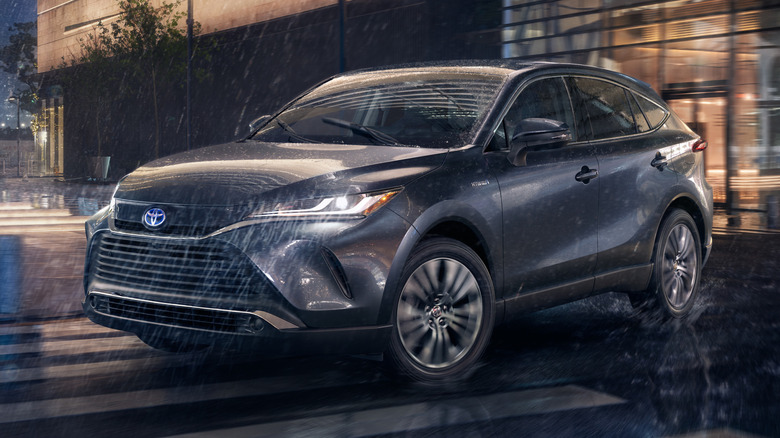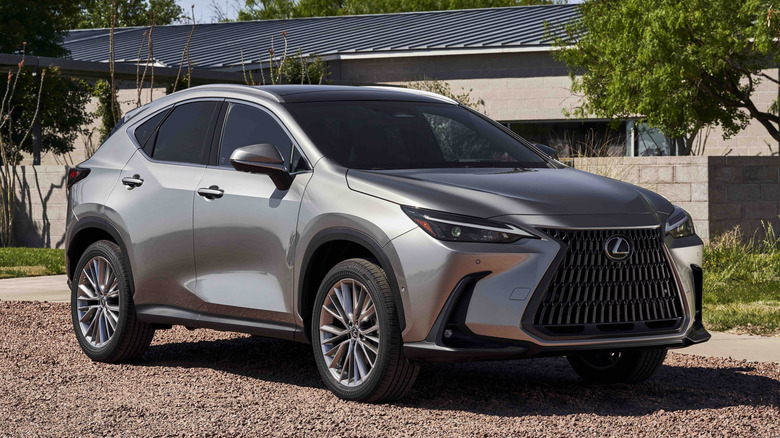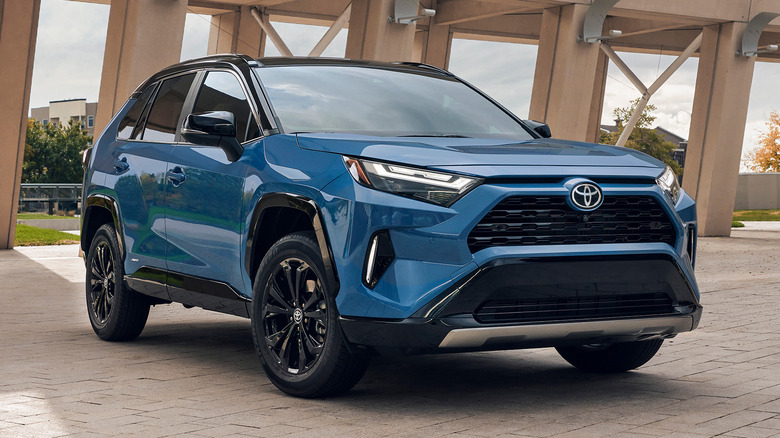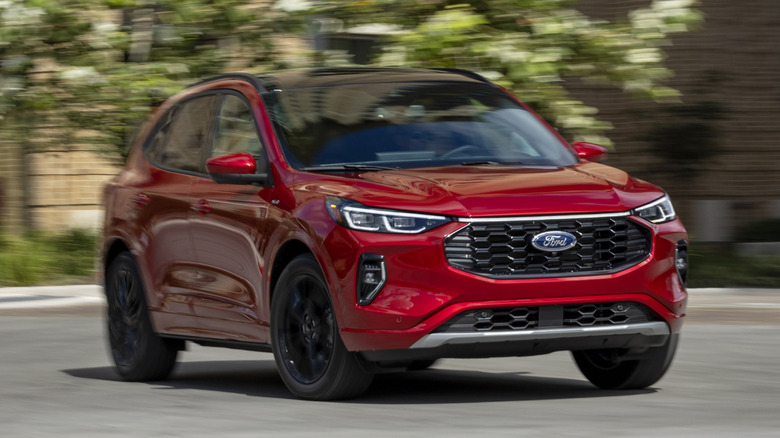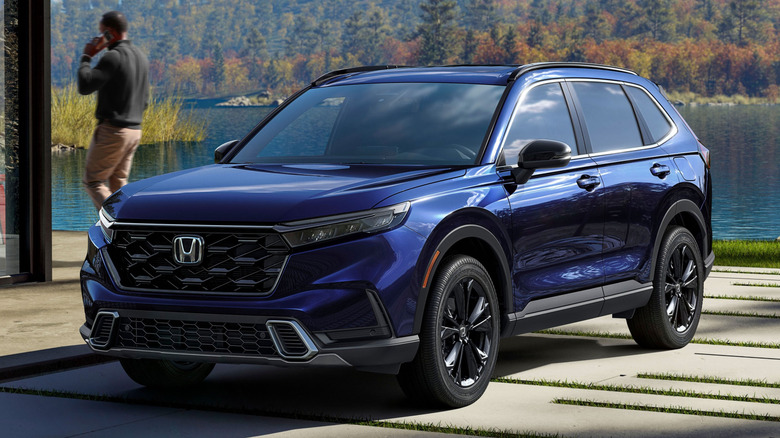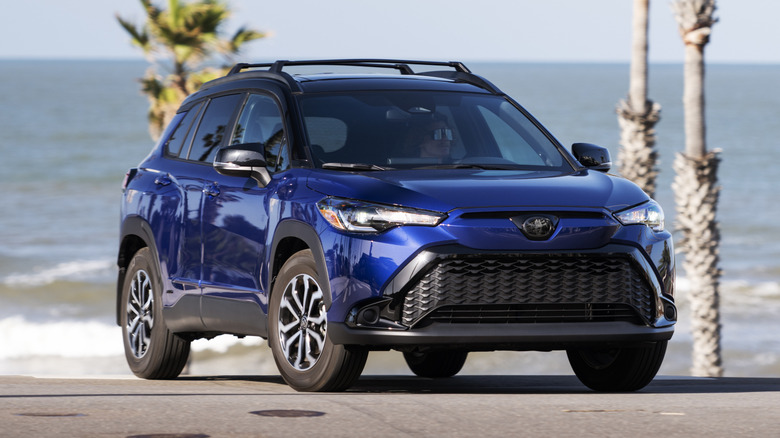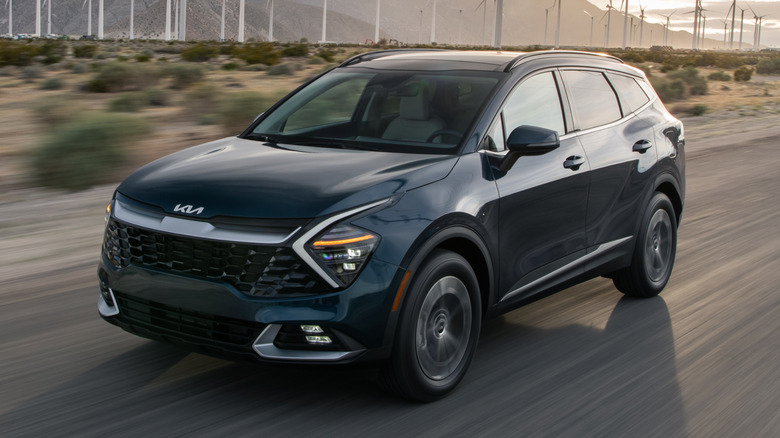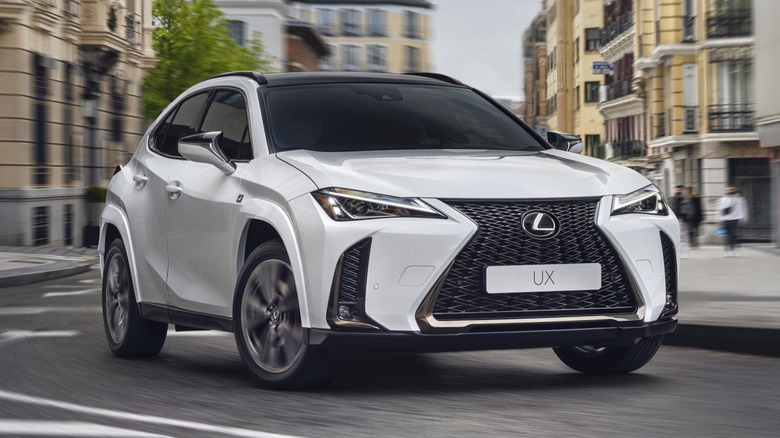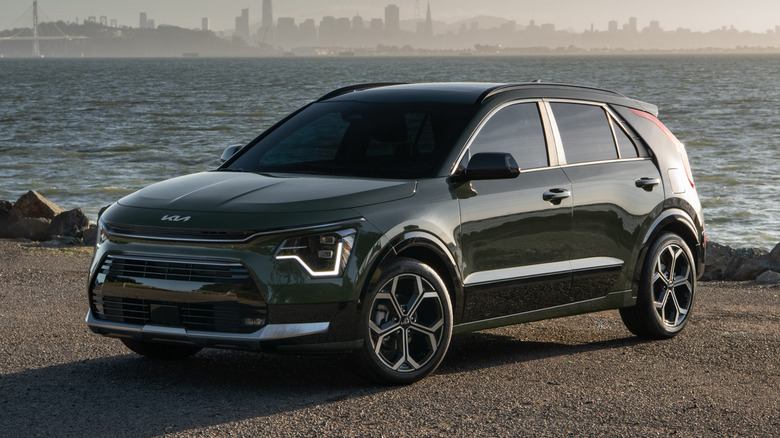2024's Most Fuel-Efficient SUVs For Big Savings At The Pump
It seems that nothing can stop the rise of the SUV. The body style is very popular with buyers both across the globe, accounting for almost 50% of global car sales in 2023 according to data from the International Energy Agency (IEA). Their spaciousness, all-terrain capabilities, and boxy looks have made them seemingly irresistible to buyers, but they come with some notable downsides. Chief among those is efficiency — generally, SUVs are much less efficient than smaller, more aerodynamic cars, leading to higher emissions and more spent at the gas pump.
However, some SUVs fare significantly worse than others when it comes to fueling costs. Many popular SUV models are now available as hybrids, while others feature smaller, more efficient engines that drive down their gas consumption considerably. We've analyzed data from the EPA to find the 13 most efficient SUVs on the market right now, including both 2024 and 2025 model years within the rankings.
To ensure a fair comparison, we've excluded plug-in hybrids from this list — their efficiency depends a lot on how much drivers use the all-electric range, and will drop considerably for buyers who rely heavily on the gas drivetrains. That won't be a problem with the SUVs here, so drivers can expect great fuel economy from each no matter their driving style.
Lexus RX 350h — 36 mpg
Lexus has long cultivated a reputation for making some of the most fuel-efficient cars on the market, and its latest batch of models is no different. The RX is the brand's longest running SUV nameplate and it is positioned above the NX in the brand's lineup. According to the EPA, the RX 350h achieves a combined rating of 36 mpg, a city rating of 37 mpg, and a highway rating of 34 mpg. The RX 350h is the most efficiency-focused variant of the RX, but for buyers looking for extra power, the more potent RX 500h F Sport Performance is also available.
SlashGear's verdict on the top-spec RX 500h F Sport Performance was mixed. Reviewer Michael Teo Van Runkle found the drivetrain and ride to deliver on the "performance" element implied by its name, but overly sensitive safety tech and a high asking price dented the car's appeal significantly. That makes the RX 350h arguably a more sensible buy than its top-spec sibling, not least because it'll cost less at the gas pump over the long run.
Kia Sorento Hybrid — 37 mpg
Japanese manufacturers make up a significant proportion of the top performers here, but South Korean carmakers have plenty of representation too. The 2024 Kia Sorento Hybrid is a particularly strong performer for its size, with EPA ratings of 37 mpg combined, 39 mpg city, and 35 mpg highway in front-wheel drive form. That's significantly more efficient than the non-hybrid 2024 Kia Sorento, which makes buying the electrified variant a highly appealing choice for those who can justify the extra outlay.
For the 2025 model year, the Sorento Hybrid received a facelift, and its EPA figures were also revised. The latest iteration gains an official rating of 36 mpg across combined, city, and highway ratings, making it slightly less efficient overall than the 2024 model. Whether drivers will notice the difference in real-life driving is another matter, and anyway, the 2025 model remains a top scorer for efficiency in its segment despite its slightly downgraded ratings.
Hyundai Tucson Hybrid Blue — 38 mpg
Kia's South Korean parent company Hyundai also makes an appearance in the rankings with the Tucson Hybrid Blue, the most efficient hybrid variant of its family-oriented SUV. For 2025, the Hyundai received ratings of 38 mpg across the board — that is, combined, city, and highway — from the EPA. The latest model year continues Hyundai's tradition of frequently updating its bestselling models, with updates made to the infotainment system, steering wheel, and exterior styling.
According to the EPA's calculations, the Tucson Hybrid Blue will cost drivers $1,250 per year to fuel, based on an annual mileage of 15,000 miles. That represents a $2,250 saving on fuel compared to the average new vehicle over the course of five years. As well as saving money, it means drivers will be making less trips to the gas station, as the Hyundai is estimated to be able to drive an impressive 521 miles on a single tank of fuel.
Toyota Crown Signia — 38 mpg
The 2025 Toyota Crown Signia is a new hybrid addition to the Japanese automaker's U.S. lineup, offering a more spacious alternative to the Crown, which debuted two years prior. It's relatively low-slung by SUV standards, something made possible by the fact that the Crown Signia shares a platform with its sedan counterpart. It also shares its hybrid powertrain with the Crown, along with a number of other Toyota models.
The electrically assisted 2.5-liter four-cylinder engine achieves an EPA-estimated 38 mpg combined, hitting 39 mpg in the city and 37 mpg on the highway. That's particularly impressive given that all-wheel drive remains standard. Despite the Crown being a relatively new Toyota sub-brand, existing Toyota owners will find plenty that's familiar about the car. The brand's Safety Sense driver assistance suite is included on all trims, while the well-equipped interior benefits from a range of extras in top-spec Limited form. Among other things, these include heated and ventilated leather seats and a premium JBL audio system.
Toyota Venza — 39 mpg
Sporting the same 2.5-liter four-cylinder hybrid powertrain as the Crown Signia but offering marginally better fuel economy, the Toyota Venza arrived for the 2024 model year unchanged from the previous year. It boasts EPA ratings of 39 mpg combined, 40 mpg city, and 37 mpg highway, and comes with all-wheel drive equipped as standard. A range of four trims are offered, from the base-spec LE to the upscale Limited. Efficiency remains the same across each.
The 2024 model year Venza is the last, as thanks to the arrival of the Crown Signia, it's being discontinued from the lineup. Toyota decided both models overlapped too closely, and so the Venza had to go. As of this writing, it remains readily available to buy new thanks to a significant inventory at dealers, but Toyota is no longer accepting factory orders. Thankfully, buyers looking for an efficient Toyota SUV still have plenty of other options, both in the form of the Venza's successor, the Crown Signia, and in smaller models like the RAV4 Hybrid.
Lexus NX 350h — 39 mpg
The 2025 Lexus NX 350h remains mostly the same as the previous model year, and that means its impressive EPA ratings are also carried over. According to the agency, buyers can expect to see 39 mpg combined, 41 mpg city, and 37 mpg highway. All-wheel drive is standard on the NX 350h, giving drivers in snowier territories an extra layer of reassurance when winter comes. The snow was indeed falling when SlashGear tested the NX 350h, but our main takeaway didn't concern its all-season performance.
We were struck by the car's balance of everyday usability and efficiency, a balance that Lexus hasn't gotten entirely right with some of its other models. Driving the NX 350h and getting the most out of the car's hybrid powertrain didn't require any particular compromises, unlike the brand's plug-in hybrid and electric offerings. It's comfortably among the most efficient luxury mild hybrids of its size, although it's not quite the most efficient mild hybrid that Lexus has to offer — that title instead goes to the smaller UX.
Toyota RAV4 Hybrid — 39 mpg
With more than 400,000 examples sold in the U.S. in 2023, to say that Americans are fond of the RAV4 would be an understatement. SlashGear's own Adam Doud was among the scores of buyers that have already purchased a RAV4 in 2024, and offered a familiar set of reasons for that purchase in his review of the car. Its practicality, solid equipment levels, attractive pricing, and efficiency made it stand out from the rest, even in a segment with plenty of competitors.
The RAV4 Hybrid boasts EPA-certified figures of 39 mpg combined, 41 mpg city, and 38 mpg highway. That's enough to put it near the top of its class, but still marginally short of what the very best in the segment can deliver. Still, it's enough that the EPA says buyers can expect to save around $2,500 in fuel over the course of five years compared to the average new car, assuming a mileage of 15,000 miles per year. Combine that with the RAV4's many other talents, and it's easy to see why it remains a perennial bestseller.
Ford Escape — 39 mpg
The most efficient hybrid SUV from an American manufacturer is the Ford Escape, with a combined rating of 39 mpg, a city rating of 42 mpg, and a highway rating of 36 mpg according to EPA figures. The Escape is designed to be an affordable entry point into Ford's SUV range, with base-spec models starting around $30,000. That price puts it squarely in competition with rivals from Toyota, Kia, and Hyundai, all of which offer similarly competitive efficiency.
Like many of its competitors, the Escape is available in gas-powered, hybrid, and plug-in hybrid form. The hybrid is arguably the most convenient way to enjoy the benefits of electrification, offering reduced emissions and running costs without the issue of finding a charging point. Ford is looking to add hybrid options to more of its SUV lineup in the near future, but for now, the Escape remains the only Ford hybrid SUV on the market.
Honda CR-V — 40 mpg
While the Honda CR-V doesn't quite boast the same sales figures as the Toyota RAV4 in the U.S., it remains the brand's best selling model worldwide. Much like its longstanding Japanese rival, the CR-V's appeal lies in its mix of practicality, affordability, and low running costs, with the latter helped by its commendable efficiency figures. According to the EPA, the CR-V achieves 40 mpg combined, 43 mpg in the city, and 36 mpg on the highway when equipped with front-wheel drive.
Those figures give the car an EPA-estimated range of 560 miles on a single tank, and mean that drivers will pay around $1,200 per year for fuel based on an annual mileage of 15,000 miles. Opting for the all-wheel drive CR-V will reduce those figures slightly, to 37 mpg combined, 40 mpg city, and 34 mpg highway. However, whether power is sent to two wheels or four, the CR-V remains highly competitive in its class.
Toyota Corolla Cross Hybrid — 42 mpg
Toyota's smallest mild hybrid SUV is also its most efficient. The Corolla Cross Hybrid is the brand's entry-level offering, but it still packs all-wheel drive as standard and plenty of equipment, even on cheaper trims. The EPA gave the 2024 model ratings of 42 mpg combined, 45 mpg city, and 38 mpg highway, significantly above the efficiency of the average new car. As a result, the agency estimates that drivers could save $2,750 on fuel over five years compared to the average.
After spending some time with the car, SlashGear couldn't help but wonder if many potential Corolla Cross Hybrid buyers would be better served with a Prius. It might not be an SUV, but the Prius is just as roomy inside and offers even better efficiency figures than the Corolla Cross Hybrid. However, for buyers who just have to have an SUV, Toyota's smallest offering serves its role just fine, and it's still highly economical to boot.
Kia Sportage Hybrid — 43 mpg
The Kia Sportage Hybrid competes in a tightly packed segment, with plenty of rivals all duking it out on price, equipment, styling, and efficiency. Kia's family-oriented crossover SUV can beat them all on the latter, with EPA ratings of 43 mpg combined, 42 mpg city, and 44 mpg highway in front-wheel drive configuration.
To get better efficiency within the segment, buyers will have to opt for a plug-in hybrid — and then frequently charge it up. Kia offers a plug-in hybrid Sportage with up to 34 miles of all-electric range, but it comes at a significant premium. The Sportage Hybrid starts from $28,590 for the 2025 model year (excluding destination), while the Sportage Plug-In Hybrid costs at least $39,690.
That makes the Sportage Hybrid the sensible choice for cash conscious buyers, especially since its efficiency figures are already among the best on the market. Plus, our own review of the Sportage confirmed its interior space and equipment levels also remained just as competitive as previous generations.
Lexus UX 300h — 43 mpg
The cheapest Lexus hybrid on the market is also the brand's most efficient hybrid SUV. The UX 300h starts at a little under $40,000, and in front-wheel drive form it offers EPA-certified figures of 43 mpg combined, 45 mpg city, and 41 mpg highway. At an annual mileage of 15,000 miles, that translates to around $1,100 spent at the pump every year. It might be the entry level Lexus, but the UX 300h still offers plenty of upscale features, including a 12.3 inch infotainment display and heated and ventilated front seats for higher trims.
Base-spec cars offer less niceties, but efficiency remains unchanged. All trims come equipped with the brand's Safety System+ suite of driver assistance features, including dynamic cruise control, lane keeping assist, and road sign assist. Buyers looking for extra room have plenty of choice elsewhere in Lexus' lineup, with the NX, another top efficiency performer, being the next step up in the range.
Kia Niro Hybrid — 53 mpg
The most efficient hybrid SUV according to the EPA is the Kia Niro Hybrid, which boasts exceptionally high ratings of 53 mpg combined, 53 mpg city, and 54 mpg highway. It's perhaps the least SUV-like SUV on this list, with styling more akin to a European hatchback than any of the boxy off-roaders that define the segment. Nonetheless, the EPA classifies it as an SUV, and as such, it's comfortably the top performer in its segment. According to the agency's estimates, the car can achieve 588 miles on a single tank and will save $4,000 in fuel costs over five years compared to the average new car.
Those figures are impressive on their own, but the Niro isn't just about efficiency. SlashGear tested the current generation car back in 2023 and praised its spacious interior and generous standard safety tech. Its frugality also played a key role in that rating, especially since the Niro is one of the most affordable cars on this list to buy upfront. The combination of affordability, low running costs, and high levels of equipment make it a sensible choice for cash conscious and eco conscious buyers alike.
